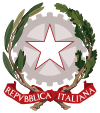Iran–Italy relations
 | |
Iran |
Italy |
|---|---|
Iranian–Italian relations refers to the diplomatic relations between Iran and the Italian Republic.
History
Iranian Revolution and Iran–Iraq War
Bilateral relations were strategically damaged in the 1980s when Iran distanced itself from all, if not most Western countries following the Islamic Revolution, and when Italy supplied Iran's enemy with economic and naval assistance throughout the Iran–Iraq War. Relations were normalized following the conflict's end in 1988.
Modern era and current relations
Iran-Italy trade stood at $US 2.7 Billion in 2001 [1] and 3.852 Billion Euros in 2003.[2] In 2005, Italy was the third largest trading partner of Iran with 7.5% of all exports to Iran.[3] Italy was the top trading partner of Iran in the European Union in early 2006.[4] Commercial exchanges hit 6 billion euros in 2008.[5]
Although Italy harbors a large population of members of the MKO as do many European Union states, Italy officially considers the group a terrorist organization.[6]
Cultural relations
In recent years, some soccer players from Iran's Team melli have been absorbed by Italian Serie A clubs. Rahman Rezai (currently of A.S. Livorno Calcio) and Ali Samereh (formerly of Perugia Calcio) are some notable examples.
The movie "Soraya", directed by Lodovico Gasparini,[7] was released in 2004, depicting the story of Soraya Esfandiary Bakhtiari. Former Miss Italy Anna Valle played the leading role of the Persian Princess who was forced to divorce from the Shah of Iran (played by German actor Erol Sander) after failing to give him an heir to the Peacock Throne. French actor Claude Brasseur plays the role of Prime Minister Mossadegh. The film was released in Italy on Rai Uno.[8]
In 2004, Italian experts were also reportedly working on plans to expand the National Museum of Iran beyond its current capacity.[9][10] Notwithstanding the proliferation of economic and cultural connections, diplomatic relations between Italy and Iran have often been disrupted seeing as the former, which is a member of the European Union supports all sanctions against Iran and is quite critical of the current leadership of Anti-Western-oriented President Mahmoud Ahmadinejad.[11]
See also
References
- ↑ "Iran-Italy trade hits dlrs 2.7 bn in 1st 11 months". Payvand.com. Retrieved 2010-05-02.
- ↑
- ↑ "The Cost of Economic Sanctions on Major Exporters to Iran". Payvand.com. Retrieved 2010-05-02.
- ↑ Italy remains top trading partner of Iran in EU
- ↑
- ↑ "International Viewpoint". Irandidban.com. Retrieved 2010-05-02.
- ↑ http://www.imdb.com/title/tt0348076/
- ↑ "Historical pictures". The Iranian. 2003-03-20. Retrieved 2010-05-02.
- ↑ "Italian Experts to Develop Iran’s National Museum". Payvand.com. Retrieved 2010-05-02.
- ↑
- ↑
External links
- REALITE-EU Italy´s Relations with Iran
- Vanderbilt Television News Archive: Iran-Italy relations during president Khatami's presidency
| ||||||||||||||||||||||||||||||||||||
| |||||||||||||||||||||||||||||||

